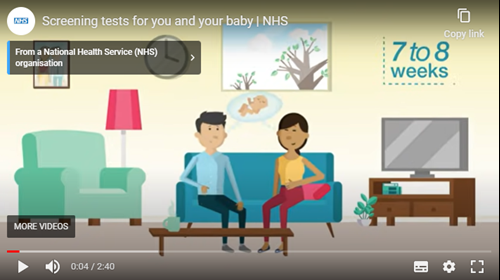The pattern of antenatal care depends on individual circumstances. For low risk pregnancies, all care will be given in the community. For higher risk pregnancies, care will be shared between hospital and community, as needed.
6-12 weeks - Early access to Community Midwife at GP surgery or designated centres/hubs.
10-12 weeks – Your first midwife appointment (also called the booking appointment) should happen around 10-12 weeks pregnant.The appointment usually takes around an hour.
6 - 12 weeks
Early access to Community Midwife at GP surgery or designated centres/hubs.
10 - 12 weeks
Your first midwife appointment (also called the booking appointment) should happen around 10-12 weeks pregnant.The appointment usually takes around an hour.
You will be offered a blood test at this time to screen for infectious diseases and sickle cell/Thalassaemia. You can read more about the screening tests on offer here:
Screening tests for you and your baby (STFYAYB) - GOV.UK (www.gov.uk)
12 week scan
If you're pregnant in England you'll be offered an ultrasound scan at around 10 to 14 weeks of pregnancy. This is called the dating scan. It's used to see how far along in your pregnancy you are and check your baby's development.
Your midwife or doctor will book you a dating scan appointment. It will usually take place at your local hospital ultrasound department. Most scans are carried out by sonographers.
The scan may also be part of a screening test for Downs Syndrome/Edwards Syndrome and Patau’s Syndrome. You can read more on these conditions here:
Down’s syndrome, Edwards’ syndrome and Patau’s syndrome - GOV.UK (www.gov.uk)
16 weeks
Your midwife or doctor will give you information about the ultrasound scan you'll be offered at 18 to 20 weeks.
They'll also help with any concerns or questions you have.
Your midwife or doctor should:
- review, discuss and record the results of any screening tests
- measure your blood pressure and test your urine for protein
- consider an iron supplement if you're anaemic
18 - 20 weeks
You'll be offered an ultrasound scan to check the physical development of your baby. This is also known as the 20-week scan. The scan wil be performed at the hospital and a support person will be able to accompany you. There is an opportunity to purchase images of the scan.
Screening for HIV, syphilis and hepatitis B will be offered again by a specialist midwife if you opted not to have it earlier in pregnancy.
These tests are recommended as they greatly reduce the risk of passing infection from you to your baby.
From 16 weeks, you'll be offered the whooping cough vaccine. The best time to have this vaccine is after your scan, up to 32 weeks.
But if for any reason you miss the vaccine, you can still have it up until you go into labour.
25 weeks
You'll have an appointment at 25 weeks if this is your first baby.
Your midwife:
- use a tape measure to measure the size of your uterus
- measure your blood pressure and test your urine for protein
28 weeks
Your midwife:
- Use a tape measure to measure the size of your uterus.
- Measure your blood pressure and test your urine for protein.
- Offer more screening tests.
- Offer your first anti-D treatment if you're rhesus negative.
- Consider an iron supplement if you're anaemic.
31 weeks
You'll have an appointment at 31 weeks if this is your first baby.
Your midwife should:
- Review, discuss and record the results of any screening tests from the last appointment.
- Use a tape measure to measure the size of your uterus.
- Measure your blood pressure and test your urine for protein.
34 weeks
Your midwife should give you information about preparing for labour and birth, including how to recognise active labour, ways of coping with pain in labour, and your birth plan.
Your midwife:
- Review, discuss and record the results of any screening tests from the last appointment.
- Use a tape measure to measure the size of your uterus.
- Measure your blood pressure and test your urine for protein.
- Offer your second anti-D treatment if you're rhesus negative.
They'll discuss with you the reasons why a caesarean might be offered, what the procedure involves, the risks and benefits, and the implications for future pregnancies and births.
36 weeks
Your midwife should give you information about:
- Breastfeeding.
- Caring for your newborn baby.
- Vitamin K and screening tests for your newborn baby.
- Your own health after your baby is born.
- The "baby blues" and postnatal depression
Your midwife will also:
- Use a tape measure to measure the size of your uterus.
- Check the position of your baby.
- Measure your blood pressure and test your urine for protein.
- Offer external cephalic version (ECV) if your baby is in the breech position
- There will be an opportunity at this appointment to discuss labour and birth including where you wish to have your baby and what type of birth you wish to have.
38 weeks
Your midwife or doctor will discuss the options and choices about what happens if your pregnancy lasts longer than 41 weeks. This will include being offered an Induction of Labour and option to discuss alternatives.
Your midwife should:
- Ask you about your your general health and wellbeing and if there are any concerns you wish to discuss
- Discuss your mood, fetal movements, when to attend Maternity Triage
- Use a tape measure to measure the size of your uterus and plot this on your customised growth chart.
- Measure your blood pressure and test your urine for protein.
- Complete your CO monitoring
- Ensure you have follow up appointments or referrals made.
40 weeks
You'll have an appointment at 40 weeks
Your midwife should:
- Use a tape measure to measure the size of your uterus.
- Measure your blood pressure and test your urine for protein.
- Membrane sweep, also known as a cervical sweep to bring on labour will be discussed and offered to you.
- Discuss the options and choices for induction of labour and alternative options available if your pregnancy lasts longer than 41 weeks.
41 weeks
Your midwife will see you at 41 weeks if you have declined induction of labour. She should:
- Use a tape measure to measure the size of your uterus.
- Measure your blood pressure and test your urine for protein.
- Offer a membrane sweep.
- Discuss the options and choices for induction of labour and alternative options available
- Your midwife will arrange an additional appointment between now and 42 weeks.
42 weeks
If you have not had your baby by 42 weeks and have chosen not to have an induction or planned caesarean section, you should be offered increased monitoring of the baby and referred for an appointment with our on call Obstetric Consultant. You can also get support from our Consultant Midwife.



